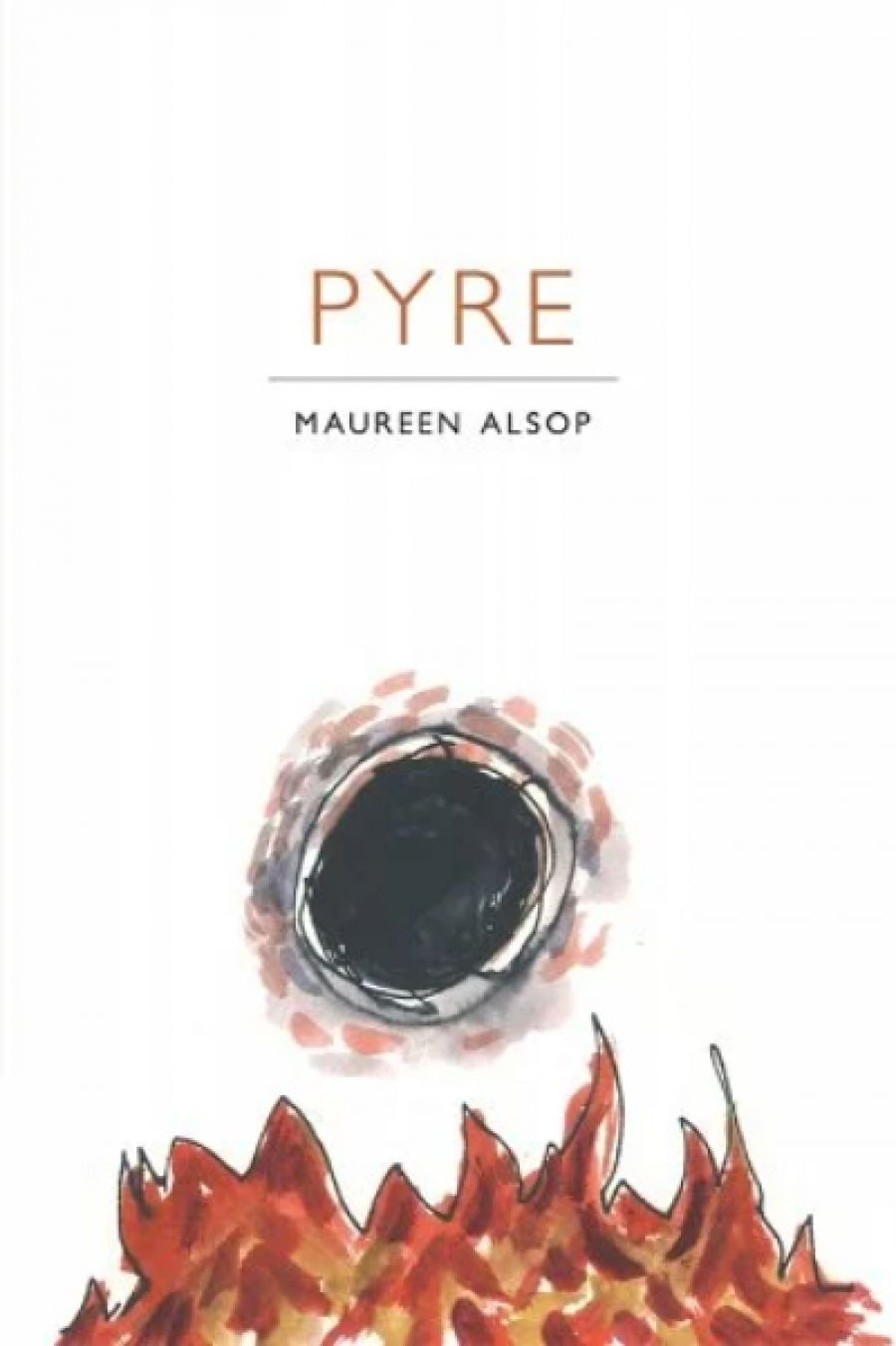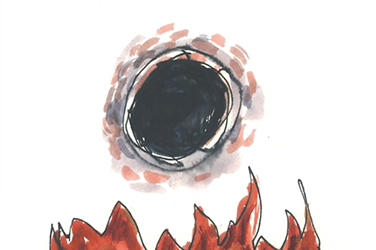
- Free Article: No
- Contents Category: Poetry
- Review Article: Yes
- Article Title: A continuous elegy
- Article Subtitle: Maureen Alsop’s syntax of loss
- Online Only: No
- Custom Highlight Text:
‘Every sacred language,’ writes Octavio Paz, ‘is secret. And conversely: every secret language … borders on the sacred.’ In the liminal Pyre, poet Maureen Alsop traverses – and erodes – this secret/sacred border, which is also the border of life and death, ‘the valley between our language’ (‘North Channel’). Each of the book’s section titles is a variation on ‘Selenomancy’, defined on the contents page as ‘a divination by the observation of the phases and appearances of the moon’. That Alsop titles multiple poems ‘Sky An Oar’, moreover, betrays the purpose of these divinations: to reach the other side, the ‘village across the waters’ that ‘burned all night’ (‘Witness’). The collection’s challenge, which it mostly meets successfully, is to remain on the compelling side of hermeticism.
- Article Hero Image (920px wide):

- Article Hero Image Caption: Maureen Alsop (photograph via author's website)
- Alt Tag (Article Hero Image): Maureen Alsop (photograph via author's website)
- Featured Image (400px * 250px):

- Alt Tag (Featured Image): Anders Villani reviews 'Pyre' by Maureen Alsop
- Book 1 Title: Pyre
- Book 1 Biblio: What Books Press, $36.99 pb, 94 pp
Pyre can be read as a continuous elegy to multiple others, including the speaker. ‘Dear Hillary’ addresses Hillary Gravendyk, one of the two people to whose memory Alsop dedicates the book. Throughout the poem, the desire for communication with the deceased burns: ‘They spoke for guidance to each ship that paused’; ‘a scar smudged every quill’; ‘We speak once again in open arrival’. After this ‘open arrival’, however, the poem’s language grows opaque: ‘And lumens titrate a prairie’s unmet constellation, beyond which stagnant / boots cloud the gnats, motes infiltrate the nightcurtain.’
If this is the syntax of loss, it is sealed in idiosyncratic particulars. Later, in ‘Selenomancy’, the speaker apostrophises her father – ‘Father, I apologize’ – and describes ‘his burial’s many places’. Alsop’s best sentences allow such places to enter the quotidian: ‘linden shadows expand the room’ (‘Later Star, Later Blackness’). What is more, the poet expands death to encompass the living – ‘I died in a burning sweat’ (‘Sacrestia’) – and experience that can be shared: ‘I remembered our death’ (‘Chalmette’ 72). Borders do not disappear, but exist as features of a single, mutable plane.
Arcane natural, especially botanical, imagery dominates Alsop’s poems, lending them ‘a strange witchery’ (‘Selenomancy’). Material phenomena become conduits for accessing the other side, whether this divide concerns life and death or the subject’s inner and outer experience. Consider, in ‘Sky An Oar’, how nature, the body, and language fuse: ‘you held her alone hand, a faded / lupine, your pearlweed lips grazed bloodwood fingertips, her torso spelled / a new boundary’. Elsewhere, the addressee ‘read[s] the weed’s summation’ (‘Sacrament of Venus’); ‘incantations recur through blackthorn’ (‘Sepiolite’). When, at the speaker’s father’s burial, mourners ‘mulch gray pachysandra & peony’, the atmosphere is ‘atremble of sticks, / stasis, sandalwood cinder’ (‘Selenomancy’). Notice how the word ‘stasis’ leaves a trace of human behaviour, as if things and emotions held the same status, burned on the same pyre. Alsop’s phrasing is often luminous: ‘In the year of ghost-holly-noon in winter and chestnut sky at night – / the dead’s voices carry dowry-bells and silver spools / along the river’s collarbone’ (‘Selenomancy’). At times, however, the craft feels too lapidary, as when Alsop uses multiple possessive nouns in quick succession. In the first stanza of one poem, we find ‘snow’s miscarriage’, ‘love’s copyright’, and ‘the landscape’s grammar’. Inverted syntax, likewise, can shimmer – ‘[i]nto the tell of it I asked’ (‘Crimes Tonight’) – or feel overworked: ‘beautiful it is when you say I am’ (‘Gabion’). But such overworking may be necessary in a poetics this private, as readers of Paul Celan or Emily Dickinson will know.
Perhaps unsurprisingly, one of Pyre’s chief subjects is language itself. The book abounds in instances where words cannot accomplish their task: ‘the day’s failed confession / a black stone on the tongue’ (‘Ballast’); ‘our syntax / was damaged. A pierced liquid’ (‘Parenthesis Skyline’); ‘O sublingual address, please speak’ (‘Equuleus’); ‘what words came, / came in pieces.’ (‘Selenomancy’). Most climactically, in ‘North Channel’, ‘sumac claims the throat’. But is this claiming a gag, or a new speech – that of things, of nature? If one has the power to ‘edit … the sea’ (‘Selenomancy’), then can sumac speak the unspeakable, culture and nature –
and life and death – being one? Alsop hints at as much: ‘your afterlife’s translation was my language’s / reversal’ (‘Oculus’). Wanting to interpret death, to speak across it, the poet reverts to the phenomenal, the figurative, the ritualistic, and the ambiguous. She becomes ‘paragraph’s flax’ (‘Chalmette’).
For Paz, ‘the ultimate meaning of all poetizing’ is to recognise that life is death, and vice versa: ‘poetry … re-creates man and makes him assume his true condition, which is not the dilemma: life or death, but a totality: life and death in a single instant of incandescence’. Through elegy, the poetic form that makes its relation to death plain, we straddle more clearly what Alsop calls ‘our / invisible boundary mapped by water-edge & light’ (‘Gabion’). We add depth to the feeling that ‘when the one you love goes, a part of you follows’ (‘Sky An Oar’). That the poems in Pyre inhabit so secretive a space, and that Alsop avoids sounding overt notes of autobiography or personal emotion, ensures that this book, preoccupied with death, cannot be read as tragic. Neither, it must be said, does it console in the conventional sense. It is, for all its difficulties, a wondrous display of poetry’s capacity to touch what is most evanescent, ‘something to secure a wisp of blue smoke’ (‘Why Loss Burns Back the Only Accompaniment Our Name Hardly Saves’), and to grasp, with this touch, an intimacy that was always there.


Comments powered by CComment